Rabia Gale's Blog, page 23
June 23, 2012
unseen cover
Ta-da! The cover of my next short story collection:
This was designed by the fabulous Robin Cornett, who got it to me in between selling her house in Florida, packing up all her stuff, and moving with husband, children, and dog to Tennesse. (See, I told you she was fabulous!)
Blurb coming up soon, and I hope to have the collection go live next week.
[image error]


June 20, 2012
absent parents in children’s fiction
A while ago, Shannon Hale put up an interesting post about the trend of absentee parents in children’s literature. Here’s the bit I find most telling:
A few years ago, I read a Horn Book article about the lack of mothers in fairy tales and books, and it mentioned, among others, Princess Academy. The article’s writer (I’m embarrassed I can’t remember who) challenged herself to change that and write a book where the protagonist’s mother was a present, strong character. She talked about her work and how she had to scrap it. In a story, it’s just impossible for a child/teen to have any adventures, to grow on his/her own with a mother present. The mother would take care of everything, the mother would carry the burden of worry.
I agree. It’s really hard for children or teenagers to have high-stake, high-risk adventures (of the sort that make good stories) with strong, involved parents present. As a child reader living in a safe, protected family home, I wanted to live vicariously through characters who had dangerous adventures. I didn’t want books about children whose parents picked them up on time, checked their homework, and protected them from the travails of life. I wanted to read books about children who ran away, crash-landed on deserted islands, defeated the Dark Lord, and solved the mystery (thought not necessarily all in the same book!).
Part of growing up is wanting to have adventures without any grownups around. My own children, for instance, have often made plans to run away (only for the day, they want to be back by nightfall). I don’t see this as an indictment of my parenting, but a natural desire to test themselves against the world. After all, isn’t that what I’m supposed to be preparing them for? My parenting is supposed to equip them with the knowledge, skills, and character to deal with the world. Occasionally, they just want to get out there sooner than I am ready to let them *grin*. Fiction provides a safe way for them to experience the danger and adventure they won’t get while Mom and Dad are around.
That said, my favorite absentee parents are those of the kids in Arthur Ransome’s Swallows and Amazons. After her four children beg to be allowed to take their boat and sail around and camp onhe islands for a few weeks, the mother telegraphs her naval officer husband for his input. The father’s response? A terse but awesome telegram:
BETTER DROWNED THAN DUFFERS IF NOT DUFFERS WONT DROWN
A father who trusts his children to have adventures and take acceptable risks? How cool is that?
What are your thoughts on absentee parents in children’s fiction?
[image error]


June 18, 2012
shattered: price change
A quick note to let you know that I’m going to raise Shattered’s price this weekend. I’ll start with Smashwords, and once it’s pushed the price change to all its channels, I’ll change the price on Amazon and Barnes & Noble. From what I’ve heard, that could be a weeks-long process. But I wanted to give you the heads-up so you can grab Shattered at the 99c price tag.
Also, Shattered has received some lovely reviews. Tehani Wessely at Australian Speculative Fiction in Focus says: “Absorbing, dark and twisted, these three stories take you back to the shadowed elements of the Grimm’s, and nowhere near where you expect to be. Highly recommended.” Jennifer at Once Upon A Twilight gives it their “Outstanding Story” rating.
If you are a reviewer and would like to read Shattered, please feel free to contact me. I would be delighted to send you an e-copy.
All right. I’m done tooting my own horn. Now it’s your turn. Do you have any stories (novels, shorts, flash fiction, novellas) out in any form (self-published, traditionally published, e-zines, free on your site, etc.)? Let me know in the comments!
[image error]


June 15, 2012
afterlife, with corporate lawyers
June 12, 2012
david farland’s professional writers’ workshop
I’m baaaack from my week in Utah at David Farland’s Professional Writers’ Workshop. Dave is an award-winning, bestselling author of fantasy and science fiction and a great writing teacher.
So, what did I learn during this time? Read on for a sampler of the many many topics Dave covered in this comprehensive workshop…
On the writing side, we learned how to
structure our novel (complete with graph)
escalate our conflicts
write dynamic descriptive passages
make readers care about our characters
create the right resonance with other great books in our genre (Dave dissected Harry Potter and the movie Avatar to show how Rowling & Cameron did that)
And on the business side, Dave talked about
the different ways a fiction writer can generate income
the importance of looking after our greatest asset as writers–our brains
how to find editors/agents
how to promote our books
and (of course) today’s trendiest issue for writers: traditional publishing versus self-publishing
It was not all a data-dump, however. Every day, Dave assigned us a writing exercise with a particular focus–say, descriptive writing. After slaving over the assignment in the evenings, we read aloud our scenes the next day and got critiques from everyone. I’ve always hated reading aloud anything I’ve written–it sounds so stupid to my ears–but this was the best way to overcome my fear of public readings. By the end of the week, I was hardly bothered by the Pit of Doom that opened up in my stomach every time it was my turn to read. Dave also had one-on-one sessions with each attendee to answer specific questions (how cool is that!).
The other great thing about the workshop (for me) was the face-time with a diverse group of writers. In our group of seven, we had a professional musician, a copywriter, a lawyer, a bookseller, another stay-at-home mom (like me! yay!), and a guy who really wants to win Writers of the Future (I’m sure he has a job, but I don’t remember what it is). I was impressed by the quality of their writing and the insight displayed in their critiques. I haven’t done much critiquing of anyone else’s work besides Jo’s since I gave up the OWW, so I was a bit rusty. It was another good get-me-out-of-my-comfort-zone experience.
(Flipping through my notes here) Amongst all the nuggets of gold, these ones shone the brightest to me:
1. “Writing style can kill your book”. That’s a big one for me, since I do adore a well-turned phrase or a smooth metaphor. I never begrudge other authors their sales, their fans, their plots, or their characters, but let them use a beautiful sentence or evocative phrase that I wish I had come up with and I am muttering darkly (and enviously) under my breath. So, my takeaway is: write well, but focus on STORY, not style.
2. “Failure of imagination is the biggest failing of any story.” Then Dave proceeded to show us how we’d failed to imagine bigger and better when critiquing the first 20 pages and outlines of our novels in progress. His comments and questions opened my mind to all sorts of possibilities I’d never considered. It felt like fireworks going off in my head. Awesome.
3. Resonance is a good thing. ‘Nuf side. My literary side (see point #1) has a horror of being seen as cliched or derivative. Now it’s been put in its place quite firmly.
So, yes! Going to the workshop was worth every penny and I’m grateful to D. for not allowing me to back out of it when I got spooked by the prices of airline tickets and hotel stays (I have a teeny weeny problem with spending money on myself).
Now I’m home and ready to put all my new-found knowledge to work. How have you been?
[image error]


May 29, 2012
an interlude
I’m back! Many thanks go out to guest bloggers for keeping things going around here! If you haven’t had the chance, check out their posts: Liana Mir takes a neat approach to writing fiction in different lengths in writing down to the bone, Tia Nevitt answers the question why a “fairy tale in reverse”? about her series of short stories set in a post-petroleum age, and my obliging husband David lists 5 webcomics worth following.
We were in California for a week, combining a family visit with a vacation (complete with knick-knacky souvenirs–my children could not get enough of those machines that squish and stamp pennies, which they promptly misplaced).
I met my nephew for the first time, caught up with my sister and father who I hadn’t seen in two years, and with my aunt who I hadn’t seen in more like twelve. Yes, the world is small, but travel is expensive and inconvenient and requires a stretch of free time which we often do not have (I envy Europeans for their vacation time). A great time was had by all, full of visits to zoos and playgrounds, Pakistani food and late-night chats. And tea. Lots and lots of tea with honest-to-goodness Pakistani biscuits. Mmmm.
And now I’m back home, but only for the week. I fly out again this weekend, this time on business (yay! I get to travel on business. Unfortunately, I have no company to pay my way). I’m off to David Farland’s Professional Writers’ Workshop out in Utah (the American West is a rather blank region in my mental map; I know it exists but I’ve never experienced it, so hooray for going to some place new). The week, I hope, will be equally wonderful as the trip I just took, but in a different way. Five days of talking about writing, learning about writing, probably actually writing. Bliss!
So, how are you? Have you taken any trips recently? Any vacation plans for the summer?
[image error]


May 25, 2012
5 webcomics worth following
Hello! This is David, Rabia’s main cheerleader…er, husband. She asked me to put together a guest post, and, well, how could I refuse, right?
Rabia suggested that I discuss webcomics (I’m not sure just what that says about what she thinks I do at work all day…). Which I thought was a pretty good idea. While a lot of webcomics are merely gag-a-day strips, there are a few that strive for something more: they set out to prove that you can tell fun, gripping, emotional stories in graphical form.
Be aware that, since these webcomics have plots, character arcs, and all the other fun goodness you expect from a novel, you really should start from the beginning for each of them. Not doing so would be like starting a novel on page 253…it won’t be as good of a book.
That said, in no particular (ok, alphabetical) order, here are my top five:
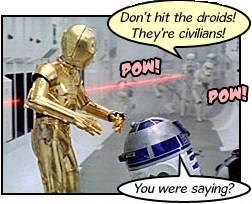 Darths and Droids
Darths and Droidsby the Comic Irregulars (start here)
Unlike all of the others that I’m going to talk about, this comic isn’t hand-drawn. Instead, the authors have decided to build a comic using screenshots from the Star Wars movies, but with fresh dialog. The basic setup is that, instead of George Lucas’s movies, we’re actually watching a group of people playing a science-fiction tabletop RPG. A lot of the…odder…things that happen in the movies are surprisingly well explained when you accept that they’re the product of players’ interactions with a game master.
Girl Genius Online
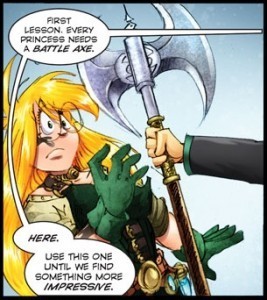
by Phil and Kaja Foglio (start here)
A steampunk comic set in Victorian-era Europe, Girl Genius follows the adventures of Agatha Heterodyne. Most of the (important) characters are “sparks” (think “mad scientist”, and you’re pretty much right). The artwork is amazing, and I’ve found it to be a delicious balance of adventure and humor. Oh, and the emperor of all cats is a main character. What’s not to love?
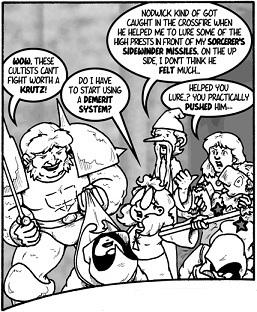 Nodwick and PS238
Nodwick and PS238by Aaron Williams (start here and here)
Ok, I may be bending the rules here by grouping two comics into one entry, but they’re by the same artist…and it’s my post…so I’m going to do it. Originally published in Dungeon, a magazine put out by the makers of Dungeons and Dragons, Nodwick follows the adventures of what could be a typical D&D group–a dull-witted warrior and a wizard, neither of whom have qualms about taking slightly less-than-moral shortcuts in pursuit of treasure, a cleric who’s generally oblivious to the antics of the first two…and Nodwick, the group’s henchman. This is not really an adventure story, as humor is often the driving force–one series had the characters singing variations on the Phantom of the Opera songs–but there is a plot line stringing it all together.
PS238 is very different. In a world where superheroes and super-villains are common, what happens to the children? Where can they go to learn about their powers, and grow up into the next generation of super heroes (and villains)? Why, Public School 238, of course! Although still humorous, PS238 is more plot- and character- driven than Nodwick.
Schlock Mercenary
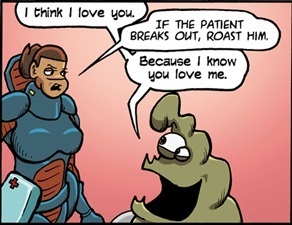
by Howard Taylor (start here)
I believe that this comic has the record for the longest unbroken publication. Since the very first comic in mid 2000, Howard has posted a new strip every single day. No guest strips, no “I’m sick so here’s a stick figure”, no excuses. And he still has time to hang out with Brandon Sanderson, Dan Wells, and Mary Robinette Kowal to make the Writing Excuses podcast that Rabia listens to. I’m in awe.
Oh, yeah, the comic. I’m supposed to talk about that. Er…it’s a sci-fi setting about a band of interstellar mercenaries (Tagon’s Toughs); the titular character, Schlock, is a sergeant on the team. Incidentally, he’s a “carbosilicate amorph”–read, alien with no particular shape. (Ever notice how alien shape-shifters seem to always hang out in humanoid form? Why is that? Schlock, as you can see in the picture, doesn’t muck around with that.) Howard’s gotten much better as an artist since he first started, incidentally. What hasn’t changed is his ability to weave humor, drama, pathos, and adventure seamlessly.
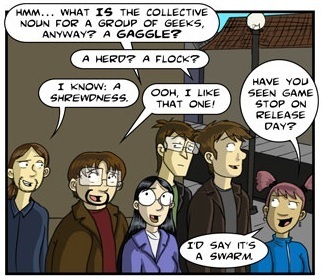 Weregeek
Weregeekby Alina Pete (start here)
This one is a little hard to describe. Set in a modern setting, the comic follows a group of five friends who regularly get together to play games, including Shadowrun, Vampire: the Masquerade, or Dungeons and Dragons. There’s an over-arching plotline about how geeks can perform amazing feats when “geeking out” about something, and a sinister group of hunters trying to eliminate geeks because of this, but for me the fun really comes from when the gang starts playing. The comic follows the characters into the games, allowing us to see very different sides of all of the characters.
Conclusion
Ok, those are my top five(ish). What are your favorites?
[image error]


May 23, 2012
why “a fairy tale in reverse”?
Our next guest blogger is Tia Nevitt. In addition to retelling fairy tales, Tia also reverses them. Here she explains what that means. Welcome, Tia!
I’ve been publishing some short stories as part of a series called Petroleum Sunset. It’s a post-petroleum era dystopian setting. The title of the first episode is “Once Upon a Gas Tank” and the subtitle is “A Fairy Tale in Reverse.” Rabia asked me what I meant by that.
That subtitle popped in my head when I was designing the cover. It is kind of a backwards fairy tale, not in that it begins happily and ends sadly, but because Ty and Joel, my protagonists, are growing up in a world that is stuck in reverse. They live in 2070 or so, but their lifestyle is very like the lifestyle of 1910, with lots of futuristic relics from the past showing up in their lives.
For example, in this first story, Ty’s family lives on a farm. They own the farm outright, but they have neither electricity nor a phone. However, their Ma is getting chemotherapy treatment at the hospital back in the city. Their last car has been stolen, and they now use horse-powered vehicles. And Pa has a couple of pulse pistols–now illegal. Grampa reminisces about the good old days when you didn’t even have to walk to school. Ty and his two brothers sleep in a junker bus that Pa decked out as a bedroom.
Cars play a big part in the story, even though their last car was stolen at the start of the story. A gang of muscle-car thieves is terrorizing the town, stealing everything with an engine and bullying the only gas station in town into providing special rates.
I tried to imagine how things would change in this world. Plastic would get valuable, and many liquids would be bottled in glass again. Grocery meats are wrapped in wax paper. Refrigeration would again depend on ice deliveries. Mules would replace tractors.
In the next episode, “Seeking a Fairy Goddoctor,” hospitals are experiencing shortages and medicine robberies. Blood is a black-market commodity. Hucksters peddle false medicine.
And in the third story, “A Happily Ever Right Now,” birth control has become scarce, and the sexual revolution is in reverse. Boys are expected to become men before they are twenty. And people start migrating back to where life is still easy, allowing squatters to take over their abandoned land.
But the main reason I called it “A Fairy Tale in Reverse” is because of this quote by Grampa in “Once Upon a Gas Tank”, where he reminisces on his youth, not far in our future:
“It was like living in a fairy tale, and we didn’t even know it,” he said one time. “A fairy tale where technology was the magic. Folks would have at least two cars, one for the mother and one for the father. And cars for the teenagers, too. They usually had a bunch of teevees and computers. Sometimes they’d have one of each in every room of the house–even the kitchen. Everyone had a phone they carried around wherever they went, and tablet devices that you boys can’t even dream about. We were always connected, as we used to say. Online. We should have known it wouldn’t last. It wasn’t a natural way to live, not at all.”
I hope you enjoy Ty and Joel’s world as much as I enjoyed writing about them.
About Tia:
Not even a stint in the military as an aircraft mechanic could erase Tia Nevitt’s love of fairy tales. To this day, she loves to read (and write) books that take her to another place, or another time, or both. She also dabbles in calligraphy, violin, piano and songwriting. Tia has worked on an assembly line, as a computer programmer, a technical writer and a business analyst. She lives in the southeast with her husband and daughter.
Tia’s novella, The Sevenfold Spell, won the 2012 EPIC ebook award for Fantasy.
Petroleum Sunset is available at Amazon, Barnes & Noble, and Smashwords.
[image error]


May 21, 2012
writing down to the bone
I’m on a blogging break this week, but guest bloggers have stepped up to fill the gap. First up is Liana Mir, talking to us about her experience moving from writing flash fiction to longer stories. Welcome, Liana!
I cut my teeth on flash fiction, though from the time I was a child, I was in love with the full-length novel. Somewhere in between my childhood and adulthood, I absorbed the adage, “Make every word count.” I’m here to tell you that those words are false—except when they’re not.
Writing flash fiction is writing to the bone. Literally every word needs to pull its own weight. At three hundred words or less, the average reader will read and pay attention to every word, and even a single wrong vocabulary choice can kill an otherwise good story.
A short story requires a little meat on those bones, a few ligaments and tendons to bind everything together and keep it walking in the right direction. At a certain point, transitions and grounding phrases become necessary. Tying phrases together with “needless” conjunctions and prepositions makes for easier reading. You have more room to pay attention to style.
Novellas have flesh. They hold the shape of a novel with only the necessary meat to fill out all the crevices. They may even have the skin and hair and eyelashes and all the pretty details. At this point, repetition and yes, that horribly maligned friend of writers, redundancy, become powerful tools to aid a reader who would otherwise lose track of the details. This is a length where it is easy to beat a revelation or theme over the reader’s head, but if you only state a thing once, it registers as invisible.
Divergent by Veronica Roth is an amazing young adult novel. The protagonist’s mother’s name is Natalie and her father’s is Andrew. These names are stated only once in the entire book. Nobody I know, including myself, had any idea of what their names were without either looking them or being told.
Repetition is a good thing.
Novels, now, these are the full-blown deal. They wear clothes. Your average reader—who is not suffering from such word-related psychological condition—does not, and does not want to, read every word. If every single word earns its place in a given sentence, on a given page, or worst of all, in a given book, then the reader has to work very, very hard to not miss anything. Note: many bestsellers are accused of bad writing because they make the reading easy.
After writing flash fictions, especially drabbles of exactly one hundred words, for a few years, I found that a common complaint cropped up about most of my work. It was hard to read. People had to go back and reread to get the point. Readers would love my writing but have no idea what was going on. This was more than a little disturbing and came solidly back to my habit of writing only the bones: omitting transitional words and phrases that were supposedly “unnecessary,” cutting out descriptions, showing with too few repetitions, or failing to make a point by telling, in addition to showing.
Bones can sing. Bones can dance. Unless you’re writing flash fiction, though, you want some flesh.
Bio: Liana Mir reads, writes, and wrangles the muses from her mundane home in the Colorado Rockies and, occasionally, from the other side of the Barrier.
[image error]


May 18, 2012
once upon a time: thoughts on the season finale
ALERT! ALERT!
HERE BE SPOILERS.
You have been warned.
Seriously.
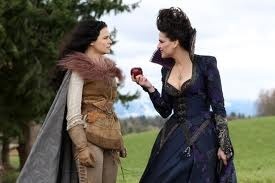
Don't make me force this apple into you!
So. Season One of Once Upon A Time is over.
WHAT DID YOU THINK??
Okay, since it’s my blog, I’ll go first. In random order:
* I was pleasantly surprised by how much they moved the plot along by the end. I was totally convinced that they were going to s-s-s-s-t-r-e-t-c-h out the revelation of why Regina had it in for Snow, what Rumpelstiltskin’s game plan was, who August was, when Emma would FINALLY believe, and then add in more stretching out until the curse was broken, everyone’s memory was restored, and then we could go back to living happily every after.
Instead, they gave it all to us in the first season. Except for the living happily every after part. Erp?
Now what? The curse is broken, but everyone is still in Storybrooke with a giant purple cloud descending on them. Magic is BAAAACK in the world again (okay for the first time in our world). Uh oh. What are the magic users–who happen to be our antagonists–going to DO with it? Lots of evil stuff, I hope. Judging by Regina’s expression at the end, she’s already spinning plans.
Personally, I’d love to see a melding of Storybrooke and Fairy Tale World, where the boundaries between them have gotten fuzzy and permeable. So that on your way to Granny’s Diner for your morning doughnut you might (oops!) fall into a siren’s pool. Or run into a werewolf. Or take a wrong turn into the Infinite Forest.
* You know, they went to a lot of trouble to make Regina sympathetic, but really? Having it in for Snow all those years? You do realize that she was a KID at the time and that her intentions were not at all malicious?And maybe, if you were going to run away with the stable boy and a kid knew of the plan, perhaps you might want to watch the kid more closely and make sure your evil mother was never alone with her. And then you tell Snow that your stable boy crush ran away to spare her feelings, but you go ahead and murder her father and send a hunstman to carve her heart out anyway? Wha–? *blink blink* Soooo, hurting feelings = bad. Carving out heart = acceptable. Mmm.
In short (too late!) the scriptwriters did not do an adequate job of convincing me of the motivations behind the Evil Queen’s vengeance.
(Speaking of which, what happened to the evil mother? Is she going to show up next season? I’d have expected Regina to have done away with mommy dearest, but it would be COOL if she showed up as as antagonist.)
* I still love Mr. Gold. Favorite character. Complex. Dry humor. In control. Hidden depths. I was SO looking forward to his learning that Belle was still alive. Unfortunately, they missed the mark on that one. Sure, Mr. Gold was reunited with Belle, but it happened in the middle of all that other stuff going on and lost much of its emotional impact. That, and it didn’t CHANGE Gold’s actions in any way. He betrayed Regina and Emma before he even knew Regina had locked Belle up. After meeting up with Belle, he went ahead and did what he was going to do anyway. So, she might as well have stayed locked up and Regina could’ve used her as a weapon against Gold next season, much as it would’ve pained me to have to wait. I think the writers dropped the ball there.
* Nice to know that there’s still a lot of Fairy Tale backstory we don’t know yet. Like how Snow and Charming managed to wrest the kingdoms away from King George and Regina. I hope that this backstory gives Regina more believable motivation for cursing all the fairy tale characters to a hideous, miserable existence in–small-town Maine?
* Also, I think Baelfire is Henry’s dad. And my reasoning behind this? Because I’m a writer, and that’s what I would do. 
* I like that the true love that broke the curse is maternal love. Nice to see something other than romantic love get its day in a Love Conquers All scenario.
Your turn. Thoughts?
[image error]







